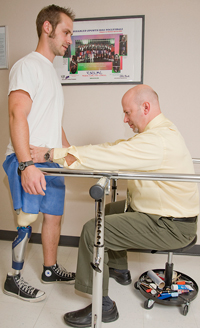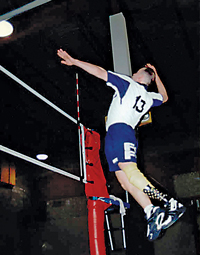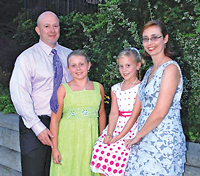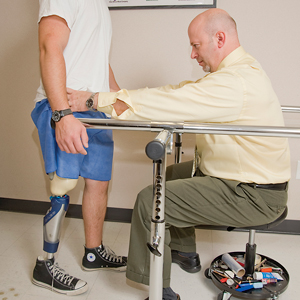 Joey Sullivan and his family moved into the house next door to us on Bandera Drive in the West End when he was three years old. His toys were still packed up, so when I tossed one of my prized Tonka trucks over the fence, a lifetime friendship began. I remember asking him about his leg, but I don’t recall his answer. It really didn’t matter. He was just my new friend Joey.
Joey Sullivan and his family moved into the house next door to us on Bandera Drive in the West End when he was three years old. His toys were still packed up, so when I tossed one of my prized Tonka trucks over the fence, a lifetime friendship began. I remember asking him about his leg, but I don’t recall his answer. It really didn’t matter. He was just my new friend Joey.
When he was a newborn, Joey’s mom had noticed a growth on her son’s left leg. After several visits to specialists, his mom and dad received the diagnosis no parent can imagine hearing: Joey had cancer. To save his life, the doctor said his left leg would have to be amputated just below the knee. Joey was six months old.
By the time Joey moved into our neighborhood, he’d already had his prosthetic for a few years. When we were kids, Joey’s artificial leg didn’t stop him, but it did slow him down. “Prosthetic fittings were fairly rudimentary when I was growing up,” he remembers. “I would have skin sores and pain after a long summer day of playing.” With his parents by his side, he had gone through prosthetic rehabilitation and numerous adjustments working with a company called Powell Orthotics and Prosthetics in Richmond. A company my friend Joey would one day co-own.
Founded in 1922, Powell is the oldest, continually-operating orthotics and prosthetics facility in the region. Over the years, Joe became one with the mission of this company, gaining experience with each new piece of prosthetic equipment on his way to becoming a world-class athlete. It was this drive and personal commitment that pushed Joe to not only advance the study of prosthetics, but also to mentor other prosthetic users. In 2006, after three decades on the receiving end of the care provided by Powell, Joe took a bold business step and bought into the company.
As a part of his track record of success with Powell Orthotics, Joe’s job has been to support amputees. Take Justin Caskey as an example. Justin was an average kid in love with wake-boarding who had his entire leg and hip removed while battling pelvic cancer. After his surgery, Joe worked with the young man to design and build a custom prosthetic to get Justin back on the water. A national wake-board manufacturer heard Justin’s story and is now planning to manufacture a wakeboard in his name. Jacob Rainey lost his leg in a freak sports injury, but his love of sports and competition remained. The young athlete, however, soon discovered there wasn’t a prosthetic strong enough to keep up with his activity level. Joe found the prosthetic that was right for Jacob – the Moto Knee, a multi-sport prosthetic developed by a motocross athlete. Fitted with the new prosthetic leg, Jacob ran on his first try.
It makes sense that Joe is helping people stay active, since his passion for sports and an active lifestyle have always been part of his story. Growing up, he rode bikes, played kickball, swam, and played little league football. We lined up side-by-side, with Joe as defensive tackle and me as defensive end. Once, after a big play, Joe’s leg was twisted 180 degrees – way out of its normal location. Almost as one, the crowd gasped in horror. Joe calmly straightened his leg and returned to the line of scrimmage.
As a child, the love of the game propelled Joe forward, and as he grew up, sports became even more important to him. In 1994, he started playing with the US Paralympics standing volleyball team, competing against able-bodied college teams around the country. In the 1996 Paralympics in Atlanta, his team placed fourth. Today, Joe says his proudest moment “other than starting a family” was being named captain in 1998 and leading the team to its first gold medal in the Canadian games. Two years later, the team competed in the 2000 Sydney games and one more time, in Greece in 2002.
 Staying active since his 2002 retirement from the team, Joe has coached a number of high school volleyball teams, including a Freeman High School squad that made it to the state championships for the first time in school history. He also works with a nationally-sponsored group of disabled volleyball players who teach at clinics to train amputees in agility, running, and jumping.
Staying active since his 2002 retirement from the team, Joe has coached a number of high school volleyball teams, including a Freeman High School squad that made it to the state championships for the first time in school history. He also works with a nationally-sponsored group of disabled volleyball players who teach at clinics to train amputees in agility, running, and jumping.
Working in the business of prosthetics with adults and kids over the years has given Joe a unique perspective on living with what is typically considered a handicap. The technology has advanced to a point where helping a kid feel like “just another kid” has become more conceivable.
“Happily, many kids are no longer embarrassed about their prosthetics,” Joe says. He shows off his leg, wrapped in smiley faces just like a young patient of his suggested. “I’ll work with kids to develop any idea they come up with. It’s fun for both of us, and helps build a bond that will last for years.”
Joe, who has had a prosthetic leg for as long as he can remember, says that in some ways his situation might be easier than having to adjust to a device later in life. The 42-year-old husband and father of two says he has always been completely up front about living with the prosthetic, for personal and professional reasons.
“My own daughters think my leg is cool and invite their friends over to see it when we are at the pool!” Says Joe. He adds that the world has changed for amputees. “New materials, physical therapy techniques, and a whole new mind-set about what disability Joe Sullivan of Richmond, shown here with his wife and two daughters, was on the US Paralympics volleyball team for eight years and was named captain in 1998. Means have hugely improved our [amputees] potential,” says Joe.
Speaking as an expert in the field, Joe notes that today clients in need of prosthetics are treated by a team including physical therapists, doctors, prosthetists, and social workers. “Even the training for professionals has significantly changed, and as a certified prosthetist, I’ve been invited to work with physical therapy students at Virginia Commonwealth University’s School of Medicine, teaching about prosthetic fitting and gait rehabilitation.”
Joe credits his parents with giving him the motivation to do anything he wanted to do – including thriving professionally. They wouldn’t allow him to feel sorry for himself and encouraged him to keep up with kids like me in the neighborhood. I watched my friend live through all of the emotions that accompany having an artificial leg: anger when he wasn’t the fastest runner in the neighborhood; sadness when he thought someone was judging him; joy when He could use the artificial leg in a prank. Growing up before the onset of the Internet and the connectedness it brings, there were no support groups, role models, or mentors. The bonds from family and lifelong friendships like ours helped Joe understand the importance of mentoring and serving as a role model.
“There were times of anger and frustration, of course,” he says. “I always wanted to wear long pants to hide my leg. A lot of people didn’t know how to interact with me because of my disability.” Even adults had their questions. Joe remembers teachers who had trouble figuring out how to act around him. One gym teacher in particular asked, “Can you do push-ups?” Joe remembers thinking, I’m missing my leg, not my arm.
 While Joe’s personal story of life with a prosthetic began as an infant, his patients range in age. Joe’s dedication to helping them stay mobile and independent is what sets him apart. He has a clear idea of what wellness looks like for his clients and patients: working people need to support their families and maintain a healthy, active lifestyle; athletes require teamwork and innovation to create specialized devices to help them stay competitive; children and their families need a compassionate role model and mentor to demonstrate that this is not an end, but truly a new beginning.
While Joe’s personal story of life with a prosthetic began as an infant, his patients range in age. Joe’s dedication to helping them stay mobile and independent is what sets him apart. He has a clear idea of what wellness looks like for his clients and patients: working people need to support their families and maintain a healthy, active lifestyle; athletes require teamwork and innovation to create specialized devices to help them stay competitive; children and their families need a compassionate role model and mentor to demonstrate that this is not an end, but truly a new beginning.
His ability to seem unremarkable – despite an extraordinarily remarkable life – has allowed him to help change the world for amputees with whom he works. “Every patient is different,” Joe explains. “Different problems, needs, and support systems. Part of the job is to help understand all of these and come up with a plan to get the patient the best possible outcome. Sometimes this takes a lot of one-on-one care, and that’s a pleasure for me and all of us at Powell. We learn from every patient so it actually turns into patients helping patients.”
As a natural mentor, Joe works tirelessly to live Powell’s mission of providing a lifetime of care.
Says Joe, “Who better to understand this, than a lifelong amputee who has decided that amputation is not a disability, but rather, a rebirth to a new and different life?”




